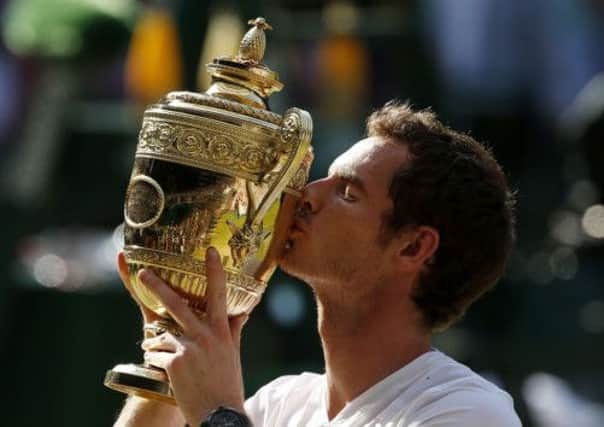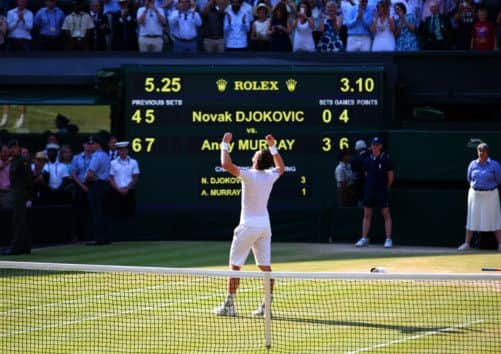Andy Murray Wimbledon: Scot wins championship


If we contemplated it at all, it was no more than a random whim: the sort of thing you imagine happening only if the whole planet goes crazy and the laws of physics are suspended. Arrant nonsense, no sooner imagined than dismissed.
That supposed nonsense is now hard fact. There is nothing whimsical about it. The reality is as solid as the earth below Andy Murray’s feet as he stood and saluted the crowd, champion of his home grand slam.
Advertisement
Hide AdAdvertisement
Hide AdMurray’s 6-4, 7-5, 6-4 victory over Novak Djokovic lasted three hours and nine minutes, so in neither duration nor number of sets did it approach the epic length of some recent Wimbledon finals. Yet, although it may not have been a lengthy struggle, it was still a struggle all right: exhausting for both players on a baking afternoon, and almost as draining for the spectators on Centre Court as they saw the Scot edge closer and closer to victory.


The talk from many within the sport was of the 77 years that had elapsed since a British man last won Wimbledon, but, for Murray, this was not about Fred Perry and a history of loss that stretched back to the 1930s: it was about his own campaign, lasting less than a decade, to win this title.
Even when his results were up and down elsewhere, Murray has been consistency itself at Wimbledon. From his senior debut in 2005, he had equalled or bettered his previous year’s achievement every time he competed.
A third-round exit, then the fourth round. He missed the tournament because of injury in 2007, reached the quarters in 2008, then made it to the semis three years in a row. Last year, he lost the final to Roger Federer.
That sort of improvement is not achieved automatically, and there was certainly nothing inevitable about his win yesterday. There never is against Djokovic, who had beaten him 11 times in 18 encounters before yesterday. Murray beat his rival to win his first major title at last year’s US Open, but Djokovic won on the other three occasions – all in Australia – when they had met in a grand slam final.


What is more, Djokovic went into this match as a slight favourite, for two main reasons: he had won six grand slam finals to Murray’s one, and he had been playing that little bit better over the course of the fortnight. In Murray’s favour, though, was the fact he had done what he needed to win his previous six matches. If that meant not quite hitting the heights that Djokovic did in his semi-final against Juan Martin del Potro, so be it.
And in the first few games, Murray showed that he was capable of raising his game both from the level it had been at, and – at least some of the time – to a level that was better than his Serbian opponent could match. The No 2 seed had three break points in the opening game and, although he failed to convert them, that was still a highly promising start.
The impression that Murray had quickly got into his stride was reinforced when he rattled down two aces in the next game, which he held easily. He had four break points when Djokovic served again, and although the world No 1 saved the first three, Murray then broke him with a shot on the run.
Advertisement
Hide AdAdvertisement
Hide AdAfter that encouraging start, there came the immediate disappointment of a break back. Yet, as that first set wore on, it was clear that the Scot was playing the better tennis. He broke his opponent again to go 4-3 up, held, albeit with difficulty, to make it 5-3 and, two simpler games later, the set was his.
The set had taken almost exactly an hour, and the players were allowed a slightly longer break than usual by Swedish umpire Mohammad Lahyani before the next set started. It was an exhaustingly hot afternoon, and both men, while among the fittest athletes on the planet, were noticeably conserving as much energy as they could between points.
The second set began very well for the 2011 champion as, after two holds of serve, he won three games in a row to go 4-1 up. But that was the high point for Djokovic, as Murray fought back with a vengeance to win eight out of the next nine games.
From 4-1 he got it back to 4-4. Djokovic then took a game, but that was as good as it got for him in that set, and Murray took the next three to go two sets to love up.
It got better for him, too, as he took a 2-0 lead at the start of the third. Then came the low point: four games in a row for Djokovic. Were we looking at a comeback? No. Murray broke back immediately, then took two more games, and suddenly, at 5-4 up, he had just four points to go. Just one game and he would be Wimbledon champion.
It was a game he would later describe as the toughest of his life. When he went 40-0 up, he was almost there. When the score went back to deuce, then break point for Djokovic, all sorts of fears threatened to materialise, for Murray’s supporters if not for the man himself.
As we worried about what might happen if the score went to 5-5 and Djokovic got a foothold in the contest, Murray focused on what he was going to do with his next serve. He saved that break point, then two more.
Then he chased down a Djokovic drop shot and a fourth championship point was his. This time there was nothing Djokovic could do. A short rally ended as he sent a backhand drive into the net. At last, the title was Murray’s, and Centre Court rose as one to salute his triumph.
SEE ALSO:
Advertisement
Hide AdAdvertisement
Hide Ad